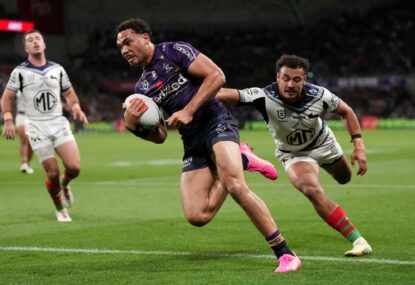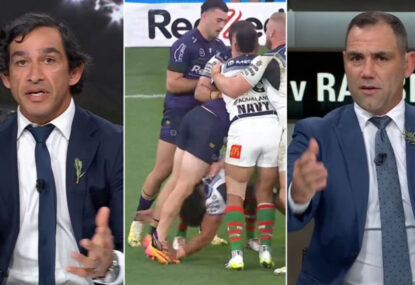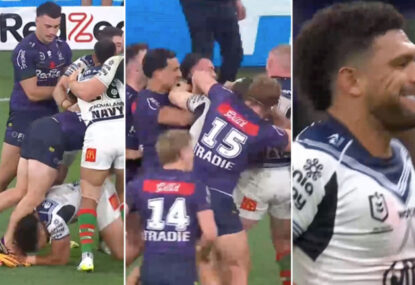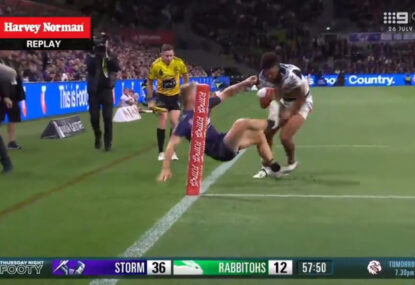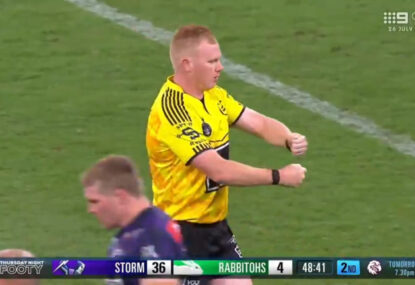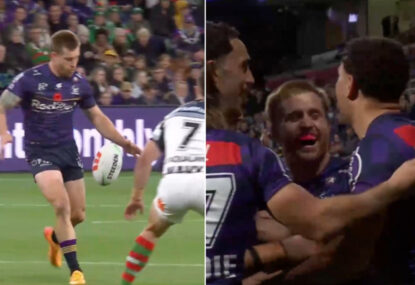To celebrate the launch of the 2020 NRL season and with talk of forecasts for 2050, I thought it an opportune time to polish the proverbial crystal ball and look ahead and then look back on the 2050 NRL season to offer a glimpse of what the game will look like in the 54th season of the National Rugby League.
The 2050 season kicked off with the World Nines tournament in Adelaide and featuring teams from both the NRL and the Pacific Islands. Despite NRL clubs refusing to release their players for the international teams, none of which emerged from the pool stage of the tournament, the NRL declared the tournament a success and a shot in the arm for the international game. The NRL though was non-committal about Adelaide’s suitability for an NRL team.
The Brisbane Bombers, captained by Hugo Lockyer, were crowned premiers, having overcome a spirited South Sydney Rabbitohs in the decider. The Bombers were received by thousands of fans as Brisbane airport, none prouder than Hugo’s dad Darren. It was a bittersweet moment for the captain’s father, having been a club great at the original Brisbane NRL club, only to see it fold two decades earlier, having struggled to compete with a second Brisbane team.
The Rabbitohs battled hard but were outclassed in the end. The players were inspired by a pre-game visit to the dressing rooms from their ageing and now reclusive owner Russell Crowe, who had sought to inspire the team with a few choice words from one of the Gladiator sequels.
However, the grand final wasn’t without controversy, as a captain’s challenge from the Rabbitohs over a disallowed try was challenged by the Bombers, before being overruled by the Bunker and then queried by the linesmen and goal judges. Thankfully, following a 13-minute delay, the three referees in a phone hook-up with the referee’s boss reverted to their original decision and the game continued.
The grand final kicked off at a delayed time of 10pm, having been pushed back from its scheduled time of 8pm due to the unseasonal heat wave in Sydney and intervention from the players’ union that playing the game in the 37-degree heat was a breach of the collective bargaining agreement.
Amazon Prime streamed the game live to an on-demand global audience. Fortunately, last-minute negotiations between the NRL and the broadcast rights holder had enabled the game to be broadcast in licensed venues across Queensland and New South Wales.
It was the first grand final that was played at the reconfigured Homebush Stadium. Now renamed Uber Eats Stadium, the capacity had been reduced to just 45,000 to provide a more intimate fan experience. Those that had been lucky enough to attend spoke highly of the convenience of having meals delivered to their seats during the game.
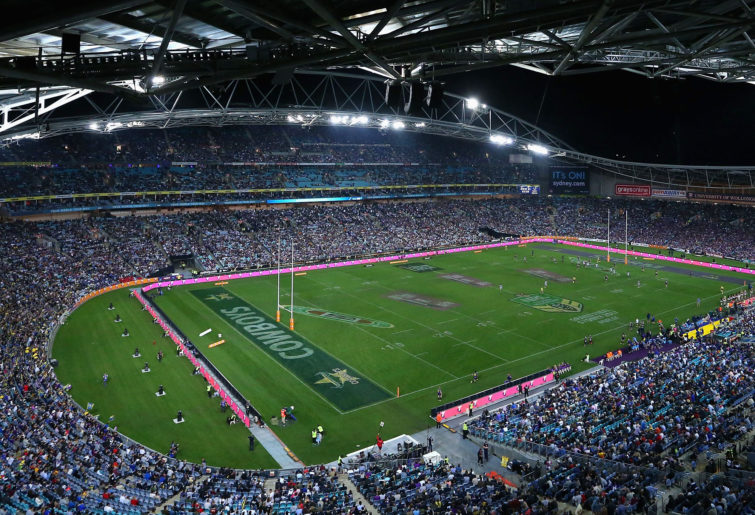
(Photo by Jason McCawley/Getty Images)
Unfortunately, strike action by NSW rail workers led to many people being unable to make it home after the game before sunrise.
Canberra enjoyed another successful season and continued to be perennial finalists, in part owing to another successful recruitment drive, no doubt helped by an increased willingness of players to train and play in the cooler winter weather of Canberra as opposed to Brisbane and Sydney. The Raiders’ pre-season training base outside Hobart is also proving to be a shot in the arm for recruitment efforts.
One of the front-runners for the year, the Illawarra Dragons were knocked out in the in the preliminary final. It was a sad end to their season and they were disadvantaged by having to switch their home final to Atlassian Stadium in Parramatta. This followed a king tide swamping their Wollongong home ground in the days prior to the game, leaving it dangerously waterlogged and overrun with jellyfish.
The Parramatta Eels also enjoyed a positive season and again saw finals action. However their premiership drought continued, reaching 64 years. There were continued grumblings from the club that their home ground was desperately overdue for a rebuild, having now stood for over 30 years.
Melbourne limped into the finals but were quickly bundled out. Their season was impacted by the unavailability of long-term coach Craig Bellamy.
The international game too wasn’t without controversy after the year-end World Cup was accused of diminishing the international game after several players qualified for residency during an airport stopover when they accepted large financial inducements to play for the fledgling Qatari national team.
Pre-season favourites the Sydney Roosters suffered a rotten run of luck with injuries throughout the year, with many blamed on the SCG cricket pitch. Playing the season with the wicket square in place was unavoidable due to the winter tour of the Indian cricket team, who had insisted on touring Australia during July/August and their further insistence that three of the four Tests be played at the SCG. Talks were continuing regarding plans to rebuild the Sydney Football Stadium.
The Northern Bears, who continued to split their home games between the Gold Coast and Gosford, were a feel-good story of the year and were in contention for a finals berth until the final round. Needing to win their final regular season game, they were desperately unlucky when star halfback, Billy Florimo, still recovering from a concussion after a dangerous tackle on the SCG wicket in the previous round, arrived at Gosford for a Gold Coast home game.
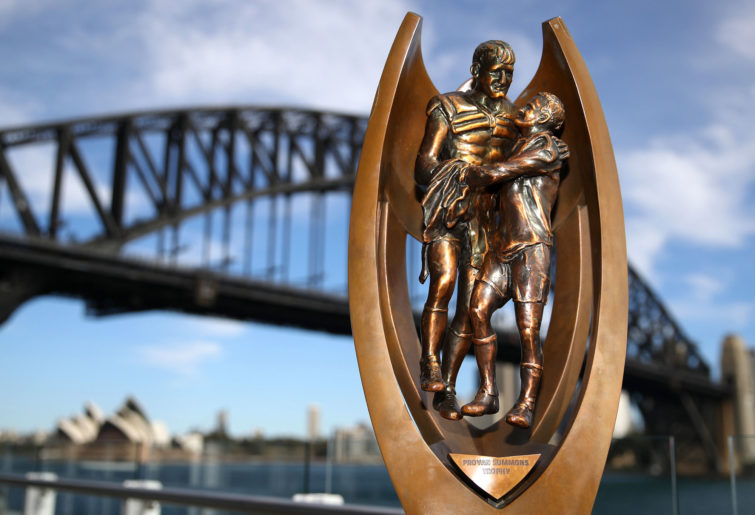
(Photo by Cameron Spencer/Getty Images)
The Townsville Cowboys played their first full season under their new club name. The change had been necessary after the northern half of Queensland ceded from the southern half to form a new state. In what became a bitter battle between cities for the state capital, Townsville emerged victorious, only after agreeing to name their team Townsville because Cairns locals didn’t want to be confused with their southern rivals.
Penrith struggled through another forgettable season and missed the finals, however fans had some good news with the announcement that the club’s godfather Phil Gould would be returning to the club in an all-powerful role overseeing the Panthers’ entire football department. At his introductory press conference Gould was quick to highlight that it would take at least five years to turn the club around.
The Bulldogs endured a disappointing season with the family club being racked by claims of nepotism as BJ Anderson, son of former coach Chris and former board chair Lynne, and grandson of ‘Bullfrog’ Moore, repeatedly picked his three sons in first grade despite consistently poor form. Surprisingly, the three came first, second and third at the club’s player of the year awards.
As was expected, the Manly Sea Eagles remained entrenched in the bottom four for much of the season. The club remained stricken by salary cap issues after a number of players had been signed to heavily back-ended contracts in recent seasons.
Despite starting the year with high expectations, the New Zealand Warriors had another disappointing season. Having recently been acquired by the New Zealand Rugby Union, the now cashed-up Warriors were beset by rumours that the bulk of their talented junior nursery would be running out for the Junior All Blacks next year.
Unfortunately the Perth Sharks continued to be a disappointment, not making the finals again and continuing to struggle since their relocation.
The Steel City had one reason to celebrate this year, with the opening of their brand new 45,000-seat stadium. Run entirely on wind and solar energy and with harvested rainwater, the stadium was at capacity for the first game at the stadium and continued to attract strong crowds. Unfortunately the team was utterly uncompetitive and won only three games for the season.
The NRL trumpeted the commercial success of the season, with much of the surplus attributable to the controversial decision to take Game 2 of the State of Origin series to the neutral city of Riyadh, where it was played in front of a mostly empty stadium except for the extended Saudi royal family and invited dignitaries. After the game the NRL refused to deny suggestions the 2051 Magic Round could be hosted at the same venue.































































































